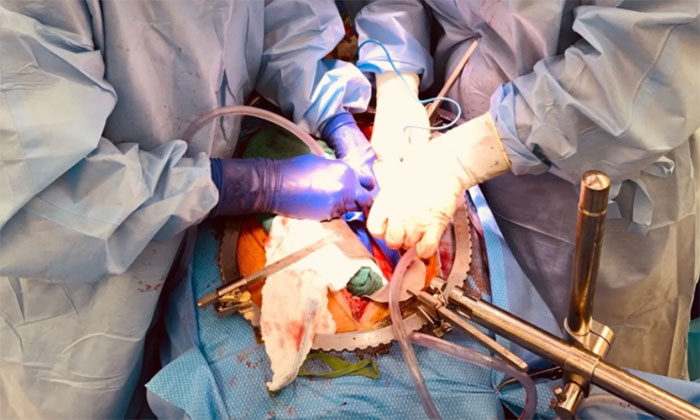On January 20, a team of doctors from the University of Alabama at Birmingham (UAB) announced the successful transplantation of a pig kidney into the body of a brain-dead individual for the first time.
According to the New York Times, although this was the second pig kidney transplant for a human, it marked the first successful implantation into a living human body.

Doctors at the University of Alabama at Birmingham performed the pig kidney transplant for a brain-dead recipient – (Photo: NEW YORK TIMES)
Back in September of the previous year, doctors at NYU Langone Health successfully attached a pig kidney to another brain-dead patient. While the kidney functioned normally, it remained outside the recipient’s body.
According to the UAB surgical team, the two kidneys began functioning and producing urine after about 23 minutes and continued to do so for three days, although one kidney produced more urine than the other.
The kidneys were transplanted into the body of the patient, James Parsons, a motorcycle racer who was injured in a race in September 2021, after his own kidneys were removed, and there were no signs of rejection for the two new kidneys.
Lead surgeon Jayme Locke stated that they strictly followed all the steps of a typical human-to-human transplant procedure.
Dr. Locke hopes that this experiment will pave the way for trials in normal patients later this year.
In their report, Dr. Locke and other authors expressed gratitude to the family of the brain-dead individual, Mr. James Parsons, for agreeing to participate in the research.

Mr. James Parsons – a passionate motorcycle racer – suffered a brain injury during a race in September 2021 – (Photo: NYT).
The team announced that they would name this type of research after Mr. Parsons, who is 57 years old and sustained severe injuries in a motorcycle race in September 2021.
The pig that donated the kidney in this surgery had 10 important gene modifications to make its organs more compatible for human transplantation.
On January 7, the University of Maryland also successfully performed the world’s first genetically modified pig heart transplant for humans.
Experts hope that advancements in this field may address the long-standing issue of organ donation shortages.
According to official U.S. data, nearly 107,000 Americans are waiting for organ transplants, with 90,000 needing a kidney. Seventeen people waiting for organ transplants die each day.


















































